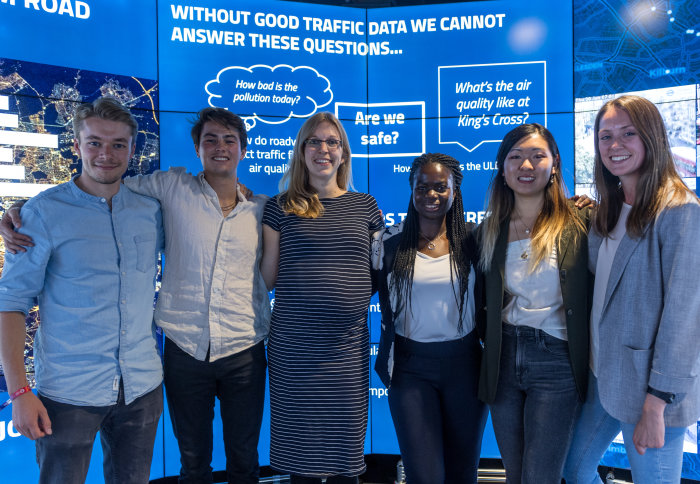Data scientists tackle real-world problems in new summer fellowship programme

data science fellows in front of a visualisation of their proposal to tackle air pollution in London
Air pollution, emergency services and unemployment were among the issues addressed by researchers in an initiative at the Business School.
The Data Science for Social Good Fellowship Programme (DSSG) is a new initiative run by the Gandhi Centre for Inclusive Innovation at the Business School in collaboration with the University of Chicago, where the programme has been hosted since 2013. Imperial is the first institution to host the programme in the UK.
The programme brings together researchers from all over the world to come up with solutions to real societal challenges, harnessing the use of machine learning, big data and data science. During the 12-week programme, they work in small interdisciplinary teams on projects with social impact, including areas such as healthcare, education, energy, transport and social services, in collaboration with government departments and non-profit organisations.
"Making a difference to society is something Imperial is passionate about, and our mission aligns well with this fellowship scheme.” Professor Nick Jennings Vice-Provost (Research and Enterprise)
The DSSG concluded this week with the Data Science for Social Good DataFest 2019 – an event attended by staff, students, entrepreneurs and policymakers at the Business School. The event was an opportunity for each of the five teams of fellows to talk through their projects and showcase interactive demonstrations around the findings.
In his introduction, Professor Nick Jennings, Vice-Provost (Research and Enterprise) highlighted how the DSSG underpins the College’s position as an international university that embraces interdisciplinary research and global collaborations. He said: “Imperial is one of the UK’s most international universities and this programme is a great example of diversity, in bringing together a really international cohort and the interdisciplinary expertise that exists within each of these teams. Getting excellent research into the public domain and making a difference to society is something Imperial is passionate about, and our mission aligns well with this fellowship scheme.”
The keynote speech was given by the Right Honourable Baroness Usha Prashar, CBE, Deputy Chairman of the British Council and a member of the House of Lords. She talked about the need for creating more dialogue between the Government, industry and universities to help better address societal challenges. She said: “What we’re seeing is the emergence of a new economy where the traditional sectors overlap in coming up with solutions to societal issues. This new economy is powered by social innovators and leveraging social networks.”
Reflecting on the event, Dr Sankalp Chaturvedi, Director of the Gandhi Centre, said: “The Datafest event was the perfect way to showcase how the Gandhi Centre is undertaking more enterprises with a social and inclusive impact. This was a wonderful opportunity to host researchers from all over the world and there was very positive and enthusiastic feedback from the audience attending Datafest. In future, we would like to do more programmes that look at how data-driven projects can achieve significant social impact.”
The five projects were:
Quantifying traffic dynamics to help reduce pollution in London
This project aims to provide more accurate information about traffic congestion through the city, so that air pollution levels can be better estimated.
The team behind this project created an algorithm that counts the number and type of moving vehicles travelling in London by analysing images from jam camera videos. The data collected by the algorithm provides a more accurate record of the number of moving vehicles and the number of times each vehicle stops and starts. This creates a more accurate picture of the level of moving traffic and associated air pollution levels across the city.
Improving outcomes for repeat/frequent 911 callers to emergency services (US)
One of Memphis Fire Department’s (MFD) key priorities is to provide effective medical care and health management through quality emergency services to the citizens and visitors of the Memphis area. This project seeks to more easily identify vulnerable people who have the potential to become high frequency 911 callers, so that the MFD can better prioritise its resources by providing emergency care to those who most urgently need it.
Improving prospects for jobseekers in Portugal
This project looks at ways to improve prospects for jobseekers in Portugal, by enabling jobseekers to get better access to advice and information about roles that match their skills and experience, through personalized information and job recommendations that take into account information about a person’s desires and restrictions and their socio-economic background. These recommendations will assist jobseekers to more effectively find suitable employment.
Reducing response times to citizens’ legal questions across Africa
BarefootLaw?, a not-for-profit organisation in Uganda, provides free legal aid to hundreds of thousands of people who would otherwise have no access to lawyers. This proposal looks at how historical data and machine learning algorithms can help improve response times to each request, reducing the need for paralegals or assistant lawyers to draft responses from scratch.
Improving cardiograms for better health
The goal of this project is to improve heart health diagnosis from echocardiogram images using artificial intelligence (AI) and other machine learning techniques to automate some of the underlying tasks.
Article text (excluding photos or graphics) © Imperial College London.
Photos and graphics subject to third party copyright used with permission or © Imperial College London.
Reporter
Laura Singleton
Communications Division